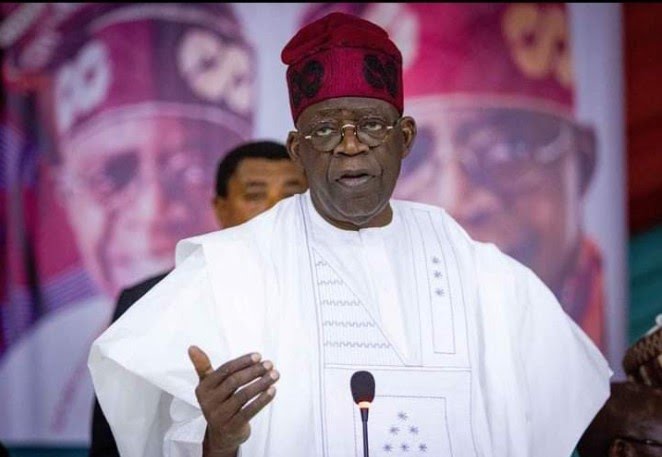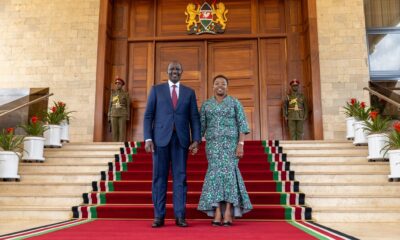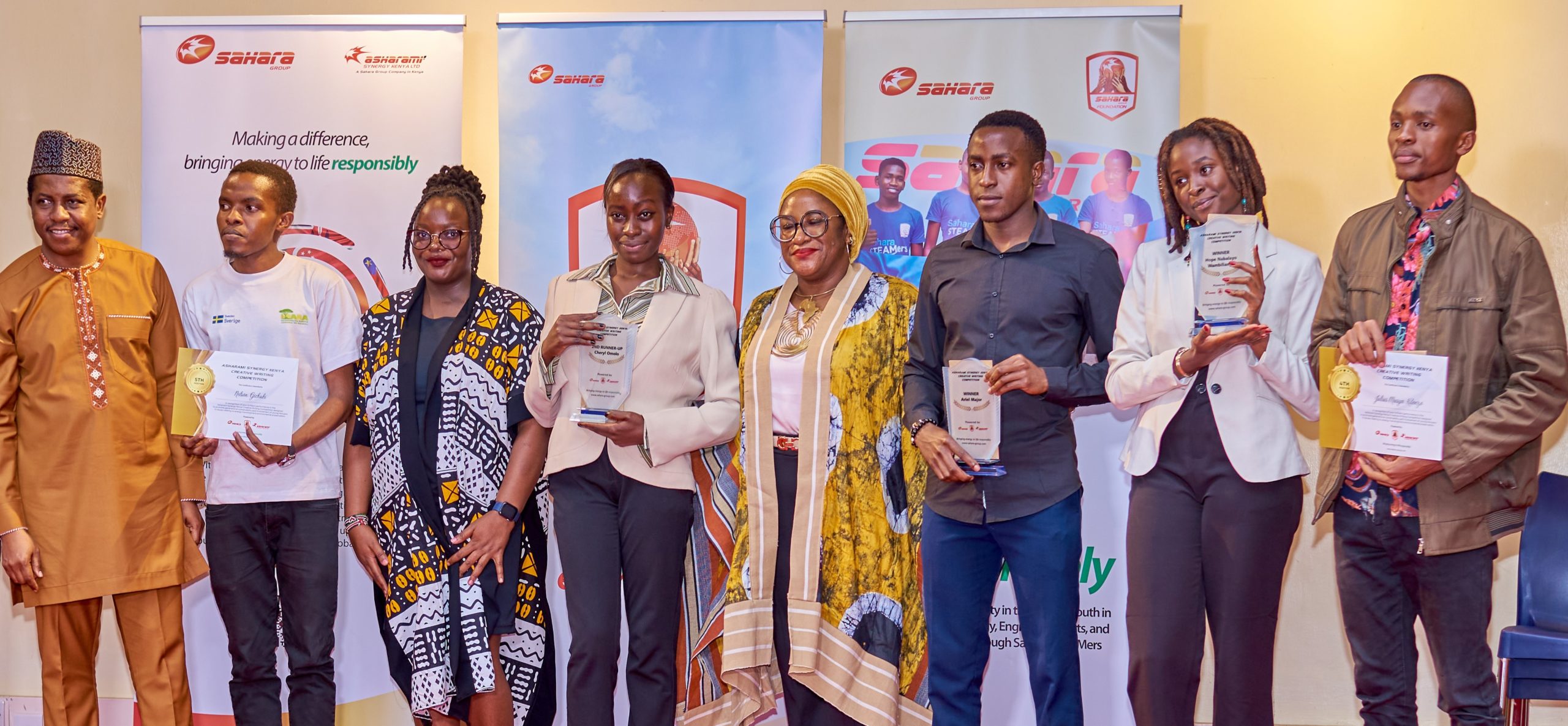NEWS
Kenya, Somalia End Long Time Rift to Foster Trade Relations
Kenya has recently taken a significant step by announcing the reopening of its border crossings with Somalia at Mandera, Lamu, and Garissa. This decision marks the end of a 12-year-long barricade that was established in 2011.
The move highlights the recognition by both nations of their mutual interests and the significance of upholding stability in the region. Additionally, there is a strong emphasis on the need for exchanging cross-border intelligence and strengthening law enforcement at the borders.
To address these concerns and promote regional security, counter extremism, and facilitate trade, mobility, and human movement, a comprehensive initiative has been launched. With a budget of around Ksh1.7 billion ($12 million) and a three-year timeline, this endeavor aims to improve the state of border infrastructure, making it modern and secure.
On Monday, Kenya officially announced its plans to reestablish the border crossings with Somalia at Mandera, Lamu, and Garissa within the next ninety days. This decision follows extensive consultations between Interior Cabinet Secretary Prof Kithure Kindiki and his Somali counterpart Mohamed Ahmed Sheikh in Nairobi.
“We have resolved that the border between Kenya and Somalia will be reopened in phases. First to open is Bula Hawa in Mandera in 30 days. Next is Liboi (Mandera) in 60 days and Ras Kamboni (Lamu) in 90 days,” CS Kindiki said. The cabinet secretary also added that the Kenyan government is also mulling adding a fourth border post in Wajir County.
“Border communities in both countries have so much in common. There is a need to strengthen cross-border communication,” CS Kindiki noted, adding that in order to maintain the stability of the two neighboring countries, Kenya and Somalia would continue to cooperate.
“Our two countries are in agreement on modalities. We will undertake internal consultation on strategies of securing gains made through our partnership,” he added.
The two ministers stated in a joint statement that their conversations focused on the necessity of sharing cross-border intelligence and improving law enforcement’s ability to man the borders.
They also talked about strategies for building modern, safe border infrastructure that would ease trade, mobility, and human movement.
The project, called “Deris Wanaag,” which is Somali for “Good Neighbourliness,” is supported by the UK and aims to find a long-term solution to the ongoing insecurity and instability caused by Al-Shabaab in the Horn of Africa area. With a budget of around Ksh1.7 billion ($12 million), the initiative will last for three years with the goal of enhancing regional security and battling extremism.
The Kenyan government increased border security when the Somali government declared an all-out assault on Al-Shabaab in August of last year in order to stop an influx of escaping terrorists into Kenya.
The Rwandan government also started a fresh initiative on Thursday of last week to reopen its border with Ethiopia, which had also been the target of strikes by Shabaab in June of last year.
Kenya plays a major role in the African Union’s military campaign against the Al-Shabaab group, an Al-Qaeda affiliate that has been carrying out a violent insurgency in Somalia for over 15 years.
Tensions between Kenya and Somalia have been exacerbated by various factors, including a maritime boundary dispute, Somalia’s accusations of Kenyan interference in its internal affairs, and Nairobi’s suspicions that Mogadishu is using Kenya as a scapegoat for its own political and security challenges.
In December 2020, Somalia severed diplomatic ties with Kenya after Nairobi hosted the political leadership of Somaliland, a self-declared independent region not recognized by the central government in Mogadishu. However, there has been a recent improvement in their relationship, with the two countries reestablishing diplomatic ties last year.
NEWS
Tinubu Appoints Vice Admiral Ibas As Rivers Administrator

President Bola Ahmed Tinubu has appointed retired Vice Admiral Ibokette Ibas as the military administrator of Rivers State following the suspension of Governor Siminalayi Fubara, his deputy, Ngozi Odu, and all elected members of the state House of Assembly.
The announcement came during a nationwide broadcast on Tuesday amid heightened political tension in the oil-rich South-South state.
Tinubu said the suspension would last for an initial period of six months.
READ ALSO: JUST IN: Tinubu Suspends Fubara, Deputy and Lawmakers
“By this declaration, the Governor of Rivers State, Mr. Siminalayi Fubara, his deputy, Mrs. Ngozi Odu, and all elected members of the House of Assembly of Rivers State are hereby suspended for an initial period of six months,” the President stated.
Ibas, a former Chief of Naval Staff who served from July 2015 to January 2021, will take charge of the state’s affairs.
Tinubu clarified that the judiciary remains unaffected and will continue to function as mandated by the constitution.
“The Administrator will not make any new laws. He will, however, be free to formulate regulations as may be found necessary to do his job, but such regulations will need to be considered and approved by the Federal Executive Council and promulgated by the President for the state,” Tinubu added.
NEWS
JUST IN: Tinubu Suspends Fubara, Deputy and Lawmakers

President Bola Ahmed Tinubu has suspended Rivers State Governor Siminalayi Fubara, his deputy, Mrs. Ngozi Odu, and all elected members of the state House of Assembly for an initial period of six months.
Tinubu made the announcement in a nationwide broadcast on Tuesday, citing undisclosed reasons for the decision.
READ ALSO: JUST IN: Rivers Assembly Accuses Fubara, Deputy Of Gross Misconduct
“By this declaration, the Governor of Rivers State, Mr. Siminalayi Fubara, his deputy, Mrs. Ngozi Odu, and all elected members of the House of Assembly of Rivers State are hereby suspended for an initial period of six months,” the President stated.
The suspension comes amid ongoing political tensions in Rivers State.
More updates to follow…
NEWS
JUST IN: Wike Renders PDP Homeless In Abuja
In what political watchers perceive as part of efforts to discomfit and scatter the Peoples Democratic Party (PDP) on the feeling that its National Working Committee (NWC) antagonises him, the Minister of Federal Capital Territory, Nyesom Wike, has revoked the rights to occupy the land on which the party’s national secretariat, Abuja is sited.
Biztelers reports that Wike’s revocation notice was conveyed in a letter released in Abuja on Tuesday, dated March 13, 2025.
The letter was titled, “Notice of right of occupancy with file no: MISC 81346 in respect of plot no: 243 within central area district, Abuja.”
ALSO READ: Explosion Hits Trans-Niger Oil Pipeline In Rivers
The letter was signed by the Director, Land Administration (FTC), Chijioke Nwankwoeze.
Wike, it was gathered predicated his action on the PDP’s failure to pay the annual ground rents due on the property for twenty (20) years, from January 1, 2006, to January 1, 2025.
The negligence on the part of the opposition party, the letter claimed was despite many publications in several national dailies and electronic media to pay up every outstanding bill and ground rent on its property.
The letter read, “I have been directed to refer to the above Right of Occupancy granted to PEOPLES DEMOCRATIC PARTY (PDP), NATIONAL SECRETARIAT and inform you that the Minister of Federal Capital Territory has in the exercise of powers conferred on him under the Land Use Act No. 6 of 1978, Cap. L5, Laws of the Federation of Nigeria 2004, revoked your rights, interests and privileges over Plot No. 243 within Central Area, Cadastral Zone A00, Abuja.
“The revocation is in view of your continued contravention of the terms and conditions of grant of the Right of Occupancy by failing to pay the annual ground rents due on the property for twenty (20) years, from Ist of January 2006 to 1st of January 2025. This is despite the many publications made by the FCT Administration since 2023 in several national dailies and on electronic media requesting all allottees of plots in the Federal Capital Territory to pay up every outstanding bill and ground rent on their property.
“You would please note that the said breaches by PEOPLES DEMOCRATIC PARTY (PDP), NATIONAL SECRETARIAT (MISC 81346) run contrary to the provisions of Section 28, Subsection 5 (a) and (b) of the Land Use Act.”
There are palpable fears that the PDP’s national secretariat might be demolished or vandalised, sooner than later because Wike added that the FCTA administration would take immediate possession of the party secretariat until all bills are settled.


















